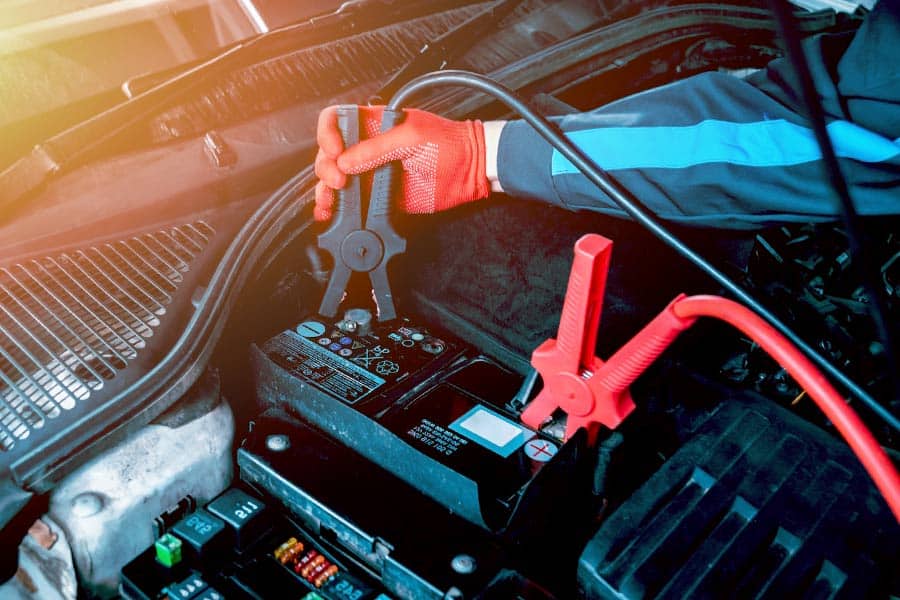
A properly working car battery is a vital component that allows your vehicle to get you from one place to another. Plus, it powers all of your vehicle’s electrical and charging system components while you’re out on the road.
When it comes to car batteries, knowledge is power. The more you know about how they and your vehicle’s electrical system work, the easier it will be to avoid being stuck with a dead battery.
In this guide, we’ve broken down everything you need to know about your car battery, including how to extend its lifespan and where to go when you need professional battery services.
How Car Batteries Work
A car battery is fairly small compared to other components under your vehicle’s hood. But it is essential to the operation of your vehicle. To put it simply, when you go to crank your engine, a cycle is initiated that starts, powers, and keeps your vehicle running.
To understand how a car battery works, you need to understand the two essential functions it performs:
Helps Start the Vehicle
Inside your engine is the starter, a small electric motor with an attached solenoid. This solenoid serves as the conduit between the battery and the starter, allowing the battery to send power to the starter. When the ignition is turned, the battery sends a jolt of electricity to the starter, which converts the electricity into the mechanical energy needed to crank the engine.
The car battery has to have a sufficient charge to be able to initiate this process. So, if the battery is dead, you will likely hear a rapid clicking noise when trying to start the vehicle. This is the starter trying to engage but not having enough voltage.
Keeps the Engine Running and Powers Engine Components
The battery also provides a steady supply of electrical voltage to enable the engine to keep running as you drive while also powering other components.
After the starter helps the engine crank, the engine will power up the alternator, which helps to recharge your battery. This is done by sending the mechanical energy back into the battery, where it is stored as chemical energy. Then, through a chemical reaction, the chemical energy is converted back into electrical energy to continue to power the starter, the vehicle’s other electrical components, and various accessories. As the car runs, this cycle continues.
That is why routine battery checks are so important. Because the car battery impacts so many other systems, it is critical to inspect it and its connections regularly. The expert mechanics here at Reliable Automotive can help make sure that you have the best car battery for your vehicle and that it stays in optimal condition to keep your vehicle on the road.
How to Tell When It’s Time to Replace a Car Battery
You cannot always predict when a battery may die, no matter how well it’s been maintained. On average, most car batteries last between two and five years. So, here are some red flags to look out for that can indicate it may be time for car battery replacement soon:
- Check Engine or Battery Warning light is illuminated: Most newer vehicles have a battery light to alert you of an issue. Or, in some vehicles, the Check Engine light will illuminate if the battery power is weak.
- Slower engine crank: When trying to start the vehicle, a dying battery will take longer to start, and the engine’s cranking will be sluggish.
- Low battery fluid: Part of the casing for some batteries is translucent, enabling you to see the battery’s fluid level. If the fluid level is lower than the lead plates inside, the battery and charging system should be tested ASAP.
- Bloated battery case: Sometimes, excessive heat can cause the battery to swell, significantly decreasing battery life.
- Leaking battery: Leaks can cause white, powdery corrosion around the battery terminals, preventing connections from being made. Clean the corrosion off and then try to start the vehicle. If it doesn’t start, the battery may not be able to hold a sufficient charge anymore.
- Old battery: Many batteries can last closer to five years. But its condition and charging ability should be inspected every year after the three-years-old mark.
If you’ve noticed any of the above symptoms, bring your vehicle into one of our convenient locations for a battery inspection before you end up stranded. Most of the warning signs above point to a dying battery. But, sometimes, it is a problem with the starting or charging system (starter, alternator, etc.).
When you bring your vehicle into Reliable Automotive, we can accurately determine the exact cause of the issue and explain what service may be needed.
How to Jumpstart a Dead Battery
Ideally, when you have battery problems, you want to get your vehicle to the closest auto shop location ASAP to test the battery and determine the next steps. But sometimes, a dead battery can happen in a not-so-convenient place.
The good thing is that unless the battery is no longer holding any charge, it can often be jump started. This will give it enough power to crank the engine and allow you to drive your vehicle straight to the shop.
But it is important to follow the proper steps when jumpstarting to ensure that you don’t further damage your battery, the starter, or the other vehicle used in the process. Here is how to properly jumpstart a dead car battery:
- Park the vehicles close to one another, ideally 18 inches apart, without touching them. Make sure both vehicles are off.
- Open both hoods and locate the batteries. Make sure the jumper cables are completely unwound and not tangled.
- First, hook one of the (+) red clamps to the positive terminal on the dead battery. Then, attach the other (+) red clamp to the positive terminal on the working battery. Then, attach one of the (-) black clamps to the negative terminal on the working battery. Finally, attach the remaining (-) black clamp to the dead vehicle’s metal, unpainted surface.
- Start the working vehicle. Then, start the dead vehicle.
- Remove the jumper cables in the reverse of the order you attached them.
- Let the jump started engine run for at least several minutes or drive for 15 minutes, if possible.
How to Extend the Life of a Car Battery
There are some things you can do to take proper care of your battery and help ensure that you get the most life out of it as possible. These include:
Try to Limit the Frequency of Short Rides
The longer the drive, the more time the alternator has to recharge your battery. So, a short car ride prevents the battery from fully charging. Frequent short car rides put excess stress on your battery. Driving the vehicle for more extended periods can help maintain the battery’s power.
Make Sure All the Lights Are Off Before You Get Out
One of the most common ways a battery gets drained is by accidentally leaving an overhead light or the headlights on. So, make sure to double-check that all of the lights are turned off (or set to go off automatically) before you get out of the vehicle. It can be helpful to park so that you have to walk past your headlights to your destination. Then, if they were left on, you won’t miss them.
Don’t Use Electronics or Accessories While the Engine Is Off
Using a phone charger, radio, A/C, etc., when the engine isn’t running can significantly stress your battery’s power supply. So, avoid using these unless the vehicle is running. Keep in mind, though, that the battery can also be worn down by extended periods of engine idling.
Don’t Leave the Vehicle Sitting for Too Long
You don’t want to let the vehicle sit for long periods without driving it. Doing so will drain down the battery. The charge will then be too low to be able to start the car. Plus, when sitting for extended periods, the battery’s fluid level will begin to evaporate, and there won’t be enough to allow the battery to hold a charge properly.
Ideally, your vehicle needs to be driven at least every three days to help maintain the battery.
A portable car battery charger is a great investment if you don’t drive your vehicle often. These chargers can provide a jumpstart If you end up with a dead battery without having to use another vehicle.
Make Sure the Battery Stays Securely in Place
Your battery will vibrate excessively if it is not securely fastened, resulting in significant internal damage. This is especially true if you frequently travel on bumpy roads. So, make sure to regularly check the battery terminals and mounting brackets to ensure that everything is properly positioned and tight.
Also, your battery cables should not have much room to move—these need to be properly secured, too.
Keep the Battery Clean
Doing what you can to ensure your car battery stays clean is a great way to extend its life and prevent dirt and corrosion from wearing it down. A mixture of baking soda and water is an easy and effective mixture to use. This combination makes it easy to use a brush and gently clean off any crust on the battery. But make sure to use only a little bit at a time. The brush should not be soaking wet.
After using this mixture, use a spray bottle of cold water to rinse it off the battery lightly. Then use a clean cloth to dry it thoroughly. Make sure no baking soda residue is left over, as it can cause corrosion. When cleaning the battery, it’s also very important not to allow any fluid through the battery ports.
Applying silicone dielectric grease (an anti-corrosion agent) to the battery terminals and replacing old battery terminal washers can also help protect your battery in our sometimes-harsh Texas climate.
Regularly Test the Battery
Having the condition of your car battery regularly tested makes a huge difference in maximizing its life. When you bring your vehicle in for a routine oil change or other maintenance services, make sure your battery’s voltage output level is also checked. This will help you track how well it’s performing and if you’re due for car battery replacement soon.
You’ll also want to have a battery load test done, ideally once a month. This checks the battery’s ability to charge properly, even in extreme temperatures.
Expert Car Battery Services When You Need Them
When your battery needs to be serviced, or it is time to replace a car battery, the experts here at Reliable Automotive can help. Our experienced Automotive Service Excellence–certified mechanics can perform a variety of battery services to meet your vehicle’s needs, including:
- Battery inspections or tests: If you are having trouble starting your vehicle or you think your car battery may be starting to fail, we can quickly check it. Our mechanics will use a multimeter to measure your battery’s output and compare the current charge level to the manufacturer-recommended specifications for your specific vehicle.
- Preventative battery maintenance: Our Texas weather can sometimes be very hard on your vehicle’s battery. To help extend its lifespan, we can perform ongoing battery maintenance, including cleaning the terminals and applying an anti-corrosion protectant.
- Car battery replacement: If your car battery is dead on arrival, we can take the old one, dispose of it properly, and install a new high-quality battery. This is usually a very quick service that takes just 20 to 30 minutes from start to finish.
So, whether you need car battery installation or just battery maintenance, we’ve got you covered. The Reliable Automotive experts proudly meet the maintenance and repair needs of drivers throughout the area, all while providing unbeatable customer service and the best prices.
You can count on us when you need car battery services in your car, truck, or SUV.
Schedule your appointment online today!






